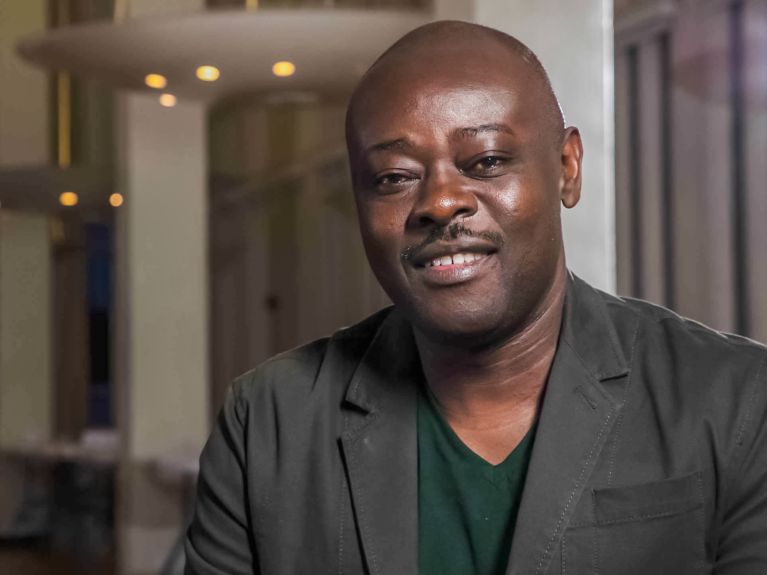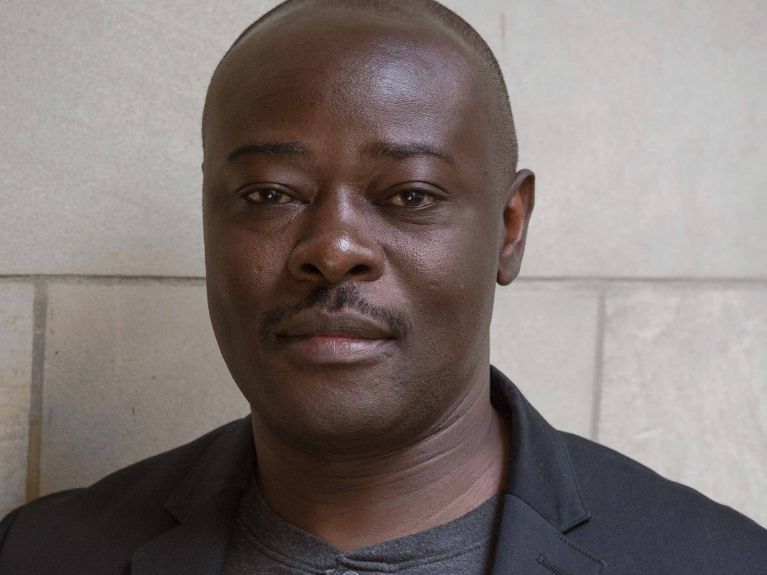“Literature can change the world”
The writer Helon Habila is Curator in Residence at the Berlin International Literature Festival. Here he talks about his connection to Germany.

Helon Habila was born in Nigeria in 1967 and is now a US citizen. A Professor of Creative Writing at George Mason University in the US state of Virginia, Habila has published four novels. A jury has chosen the writer as Curator in Residence of the Berlin International Literature Festival, which will be held from 5 to 18 September 2024 and for which Habila has curated several events.
Mr Habila, what went through your mind when you found out that you had been appointed Curator in Residence?
I was a bit overwhelmed and also nervous. It is the first time that there is a Curator in Residence at the Berlin Literature Festival. I was chosen as someone who is not European. I think that is a bold step by the organisers.
You’ve been a guest at the literature festival on several previous occasions.
I have always been impressed by how international the festival is, which brings together writers from all over the world. But one idea I wanted to implement was to bring in other voices that are not usually at such festivals, that are not only from Europe. There are others outside this circle who are doing important work, who are talented and deserve to be heard. So I said: I want to promote these younger writers from Africa, America, people of colour.
I want to promote these younger writers from Africa, America, people of colour.
Are there any authors you’re particularly looking forward to meeting?
The French-Rwandan writer Beata Umubyeyi Mairesse will be opening the festival. But there is also V. V. Ganeshananthan, for example, who has written an important book about the civil war in Sri Lanka, “Brotherless Night”. Sonia Faleiro with her non-fiction book “The Good Girls” about the murder of two girls in a village in India; or Mary-Alice Daniel, who has lived on three continents and writes about her experiences. Noo Saro-Wiwa with her non-fiction book about Africans in China. We have invited the Booker Prize winner Ben Okri. And there will be a panel on James Baldwin.
The festival has a main theme that you helped develop: “Strange New World”.
We are facing an environmental apocalypse, the rise of artificial intelligence, wars, people like Trump are on the rise, there is Covid. How is literature addressing this? We also have a panel on African futurism with authors who write speculative science fiction using African mythology to address what is going on today. I do not find it surprising that there are many books that speak almost prophetically about what the future might look like. We do not know what is coming. It is a strange new world we live in.

You were a fellow of the Berlin Artists-in-Residence Programme run by the German Academic Exchange Service (DAAD) in Germany in 2013/2014 and have been here almost every year since then. What do you think about Germany?
During my time as an artist-in-residence, I was in Germany with my family and we have many friends there now. But it is the same everywhere, whether in Germany, Europe or America, we are all struggling with changes like the rise of the extreme right. We do not have to accept it, as writers and intellectuals we should not keep quiet, we have to push back and engage to what is happening. My last book, “Travellers”, about migration, which was published in 2019 and is set in Berlin, tried to do that.
Did you have the idea for the book before coming to Germany?
I actually came with a different book, but in Germany I came face to face with what they called the migrant crisis. Boats were sinking in the Mediterranean; I was shocked. As an African, I felt that I had to interview migrants, and then I had the idea for the book.
I grew up with folk tales and I love the beauty of words.
Why did you become a writer?
I grew up with folk tales and I love the beauty of words. As I grew older, I realised: literature can change the world. I come from an African storytelling tradition with writers like Chinua Achebe who have always engaged with politics. They fought for independence and then against corrupt politicians. As a writer from a formerly colonised country, you always have to fight for the people and against injustice.
At the literature festival you’ll also be talking about your new, as yet unpublished book. What is it about?
A Nigerian comes to America, marries, has a child, goes back to his home country and dies. His daughter travels to Nigeria to bury him. This book is probably less political than my others. Sometimes you get exhausted of politics, maybe that is because of this strange new world. But of course the context of a black immigrant in the time of Trump is already political.
Do you still travel to Nigeria often?
I have lived and worked in America for 17 years, but I am often in Nigeria, many of my books are set there. Even though I am an American citizen now, I deeply care for this country. When I write about American politics, I do so as an African living in America. My world view is shaped by my role as a black man, my perspective will always be that of a Nigerian.


